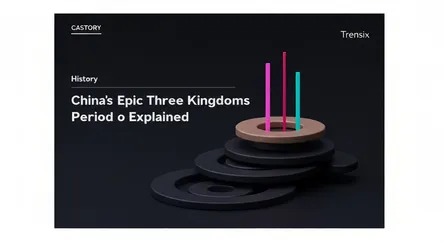History
China's Epic Three Kingdoms Period Explained

An overview of the Three Kingdoms period (220-280 AD), a pivotal and bloody era of Chinese history defined by the clash of warlords and heroes.
What is it?
The Three Kingdoms period (220-280 AD) was an era in Chinese history characterized by the division of China into three rival states: Wei, Shu, and Wu. Following the collapse of the Han Dynasty, a series of civil wars and political intrigue led to this tripartite division. The period officially began when Cao Pi founded the state of Cao Wei in 220, followed by the establishments of Shu Han by Liu Bei in 221 and Eastern Wu by Sun Quan in 229. It was one of the most turbulent and bloodiest periods in Chinese history, marked by constant warfare as each kingdom vied for control to reunite the nation.
Why is it trending?
This historical period's immense popularity is largely due to the 14th-century historical novel, "Romance of the Three Kingdoms" by Luo Guanzhong. This epic, one of China's Four Great Classical Novels, romanticizes the events and portrays its key figures—like the brilliant strategist Zhuge Liang, the valiant Guan Yu, and the ambitious Cao Cao—as legendary heroes. The novel's compelling narrative of loyalty, strategy, and ambition has made the era a favorite subject for folklore, operas, films, television series, and popular video games, keeping it relevant in modern pop culture.
How does it affect people?
The legacy of the Three Kingdoms period is deeply embedded in East Asian culture. The stories and characters have become archetypes in storytelling, influencing everything from literature to business strategies. Figures like Guan Yu are still worshipped as deities, representing loyalty and righteousness. The era's famous battles and intricate strategies, such as those seen at the Battle of Red Cliffs, are studied and referenced in both military and non-military contexts. Its enduring presence in popular media continues to introduce its complex themes of heroism, politics, and morality to new generations globally.